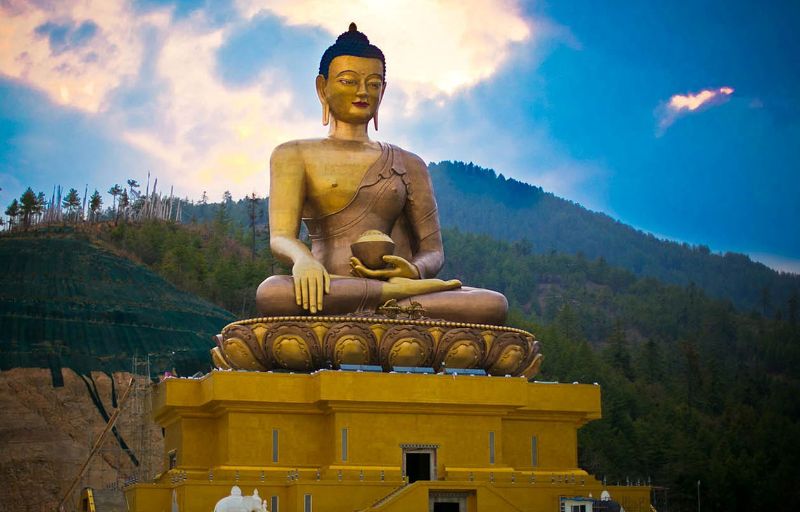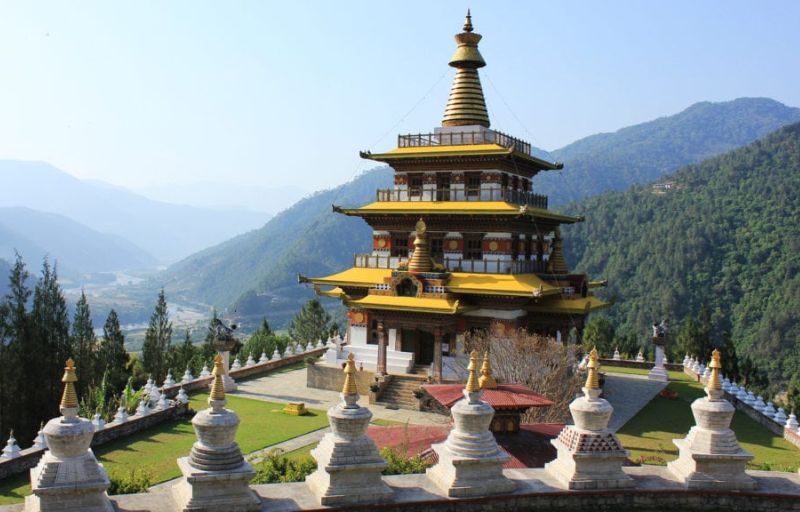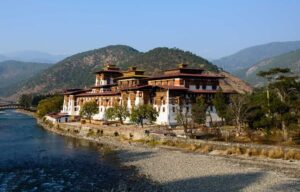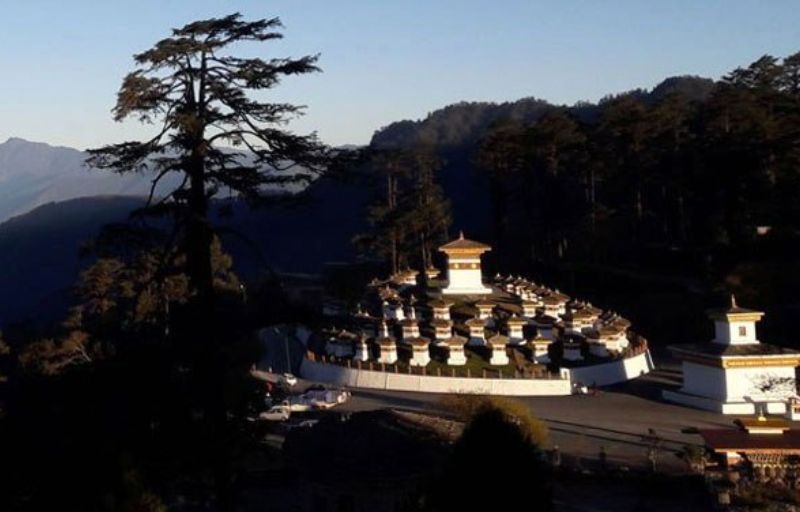Fixed departure Jambay lhakhang tour 2 2024
Jambay lhakhang festival tour fixed departure 2 (Festival dates: 15th – 18th Nov 2024). The tour date is from 13th – 23rd Nov 2024 and covers western and central Bhutan.
Hotel category: 3 star hotels.
Price per person: US $ 2875 on twin sharing basis.
Single room supplement (Extra): US $ 350.
Total duration: 10 nights / 11 days tour.
Fixed departure Jambay lhakhang tour 2 2024 - Highlights:
- Scenic landscapes.
- Ancient monasteries, temples and magnificent dzongs (Forts).
- Government institutions and museums.
- Witness the colorful Jambay lhakhang tshechu festival.
- Meet local people.
- Visit beautiful Bhutanese farm house.
Fixed departure Jambay lhakhang tour 2 2024 - Detailed itinerary.
13th Nov. Arrive Paro & sightseeing:
Meet and greet at the airport and drive to the hotel.
After lunch in a typical Bhutanese farmhouse visit to:
- Dungtse lhakhang built in the 15th century by Thang Tong Gyalpo.
- Ta dzong built in 1649, an ancient watch tower which now houses the national museum of Bhutan. This unusual building is in a conch shape with 2.5m thick wall.
- Rinpung dzong built in 1646 by Shabdrung Ngawang Namgyal. Rinpung literally means “The heap of jewels”. The dzong presently functions as the administrative centre of Paro district.
In the evening, free to stroll in the town for shopping and photography.
Dinner and overnight in hotel.
14th Nov. Paro – Bumthang sightseeing (Flight to Bumthang, 25 minutes):
In the morning, drive to the airport for flight to Bumthang. Meet & greet at the Badbalathang Airport.
While in Bumthang, visit to:
- Jakar dzong which means “The castle of white bird” was built in 1667 by the Tibetan Lama Nagi Wangchuk. This dzong sits on a small hill overlooking the Chamkhar valley. The dzong played a vital role as the fortress to defend the eastern part of the country. The first king ruled Bhutan from here. The central tower or Utse is of this dzong is nearly 50 meters high which is the unique feature of this dzong compared to the other dzongs.
- Chakar lhakhang is the site of the palace of the Indian king Sindhu Raja, who first invited Guru Rinpoche to Bumthang in the 8th
In the afternoon, visit to:
- Kurjey lhakhang: In the 8th century, Guru Rinpoche traveled to Bumthang on the invitation of the Indian King Sindhu Raja who ruled over Bumthang. The King was ill because of the curse of a local deity Shelging Karpo. Guru Rinpoche meditated in the cave and subdued the deity. The body print of the Guru Rinpoche can still be seen on the rock housed in this temple.
- Tamshing lhakhang (temple of the good message), established in 1501 by Pema Lingpa. It is the most important Nyingma monastery because of its direct connection to Terton Pema Lingpa (1450-1521) and his re-incarnations. It is now the seat of Sungtrul Rinpoche, the current speech re-incarnation of Pema Lingpa. There are approximately 95 Buddhist monks in this temple.
In the evening, free to stroll in the town.
Dinner and overnight in hotel.
15th Nov. Witness Jambay lhakhang festival & sightseeing:
In the morning, drive to Jambay lhakhang and witness the festival (Full day).
In the evening, visit to:
- Kenchosum monastery built in the 6th century, this lhakhang was renovated in 1995 and so it has a modern look to it. Legend has it that the lhakhang contained a large bell that when it was rung, the sound could be heard all the way in Lhasa, Tibet. During the 17th century, the invading Tibetan armies tried to steal the bell but because it was too heavy, they dropped the bell and, in the process, cracked it. It is now on display at the national museum in Paro.
EARLY DINNER and drive to Jambay lhakhang to witness the festival.
- Jambay lhakhang built by King Srongsen Gampo of Tibet in the year 659 on the same day as Kichu lhakhang in Paro.
Return to the hotel late at night.
16th Nov. Bumthang – Witness the festival:
In the morning, drive to Jambay lhakhang & witness the festival.
Early dinner and witness the festival at Jambay lhakhang.
Return to the hotel late at night.
17th Nov. Bumthang sightseeing – festival:
In the morning, drive to Jambay lhakhang and witness the festival (Full day).
In the evening, visit Mebar Tsho or “The burning lake”.
- Mebar Tsho or “The burning lake” is located along the way to the Tang valley. According to legend, Terton Pema Lingpa had a vision of the sacred treasures that Guru Rinpoche had hidden within the lake centuries earlier. However, the people of Tang and the local ruler were cynical of his claims. In order to prove his claims, Pema Lingpa held a butter lamp in his hand as he jumped into the lake. After remaining under water for a long time he re-emerged holding a chest and a scroll of paper with the butter lamp held in his hand still burning bright. Thereafter, the lake came to be known as Mebar Tsho or “The burning lake”. Today, this small fresh water lake is a pilgrimage site for the Bhutanese.
- Visit cheese factory.
Early dinner and drive to Jambay lhakhang and witness the festival.
Overnight in hotel.
18th Nov. Bumthang – Trongsa sightseeing – Gangtey (143 km – 5 hours):
- Ta dzong, an ancient watch tower which once guarded the Trongsa dzong from internal rebellious forces and enemies, stands on the edge of the town. The first Governor of Trongsa, Chogyal Minjur Tempa built it in 1652 and has four observation points which resembles Lion, Tiger, Dragon and a Garuda (Eagle). The shrine of Ta dzong is dedicated to the epic hero, King Gesar of Ling. Today, Ta dzong serves as a national Museum of the country and the chapel inside is dedicated to Jigme Namgyal who was the Penlop of Trongsa from 1853 to 1870.
- Trongsa dzong built in 1644 by Chogyal Minjur Tempa. The first two kings of Bhutan ruled the country from this ancient seat. As per the tradition, the King of Bhutan is appointed the Penlop (Governor) of Trongsa and then becomes the King. The dzong was strategically built by the ancient rulers to control the trade between eastern and western Bhutan.
After lunch, drive further to Gangtey. While in Gangtey, visit to:
- Gangtey Gompa monastery built in 1613 byGyaltse Pema Thinley, the grandson and mind re-incarnation of Pema Lingpa.
- Crane information center.
19th Nov. Gangtey – Punakha sightseeing (72 km – 2 hours drive):
In the morning, drive to Punakha. On the way, take a view Wangdue Phodrang dzong built in 1638 by Shabdrung Ngawang Namgyel.
While in Punakha, visit Chimi Lhakhang (temple of fertility).
- This temple was built in 1499 by Lama Drukpa Kuenley, popularly known as “The divine madman”. He travelled throughout Bhutan and Tibet as a “Neljorpa” (Yogi) using songs, humor and outrageous behavior to dramatize his teachings of salvation through sex.
After lunch, visit to:
- Punakha dzong was built in 1637 by Shabdrung Ngawang Namgyal. For many years until the time of the second King, it served as the seat of the government.
Then hike to Khamsum Yulley monastery.
- This monastery was built in 2004 by Her Majesty the Queen Tshering Yangdon Wangchuck and it overlooks Punakha valley. Perched high on a hill on the bank of the river, the chorten houses paintings belonging to Nyingmapa traditions.
In the evening, walk the longest suspension bridge in Bhutan (160 meters).
- This bridge is considered the longest of its kind in Bhutan and connects the two sides of the Pho chu river. You will get a great view of the river, valley, temple, and a good boost of adrenaline as well.
Dinner and overnight in hotel.
20th Nov. Punakha – Thimphu sightseeing (76 km – 2 hour drive):
- National postal museum where you can print your photos on the official Bhutanese stamps.
- National textile museum.
After lunch, visit to:
- National library of Bhutan which holds a huge collection of ancient texts and manuscripts.
- Painting school (School of 13 arts and crafts).
- Memorial chorten (1974) built in honor of the Third King, Late His Majesty Jigme Dorji Wangchuck. The paintings and statues give a rare insight into Bhutanese culture.
- Tallest statue of sitting Buddha in the world (51.5 meters) at Kuensel Phodrang.
- Craft bazaar where you can buy Bhutanese handicrafts and art works.
21st Nov. Thimphu – Paro sightseeing (54 km, 1 hour drive):
In the morning, visit to:
- Changangkha lhakhang, the oldest temple of Thimphu valley built in the 12th century by Phajo Drugom Shigpo.
- Takin preserve center: Takin – A queer looking animal believed to be a mix of a goat and cow.
- Sangaygang view point – Walk across the field of prayer flags.
- Dupthob lhakhang, one of the few surviving nunneries in Bhutan.
- Centenary Farmers’ market.
After lunch, witness archery match at Changlimithang stadium and drive to Paro.
On the way, visit Tamchog monastery built in the 15th century by Thang Tong Gyalpo, popularly known as “The Iron Bridge Builder”. He built 108 bridges across Tibet and Bhutan, out of which 8 were built in Bhutan. His only surviving bridge is in Duksum (Tashi Yangtse in eastern Bhutan).
In the evening, free to stroll in the town for shopping and photography.
Dinner and overnight in hotel.
22nd Nov. Paro - Hike to the Tiger’s nest monastery:
In the morning, drive to Satsam chorten and hike up the Tiger’s nest monastery (4 -5 hours walk up & down).
- The primary temple was built around Guru Rinpoche’s meditation cave in the 1684 by the Penlop (Governor) of Paro, Gyaltse Tenzin Rabgay. This incredible monastery clings to the edge of a sheer rock cliff that plunges 900 meters into the valley below. Legend has it that Guru Padma Sambhava, the tantric mystic who brought Buddhism to Bhutan flew here on the back of a flying tigress, Dorji Drolo, said to be his favorite consort.
NB: You can hang the prayer flags near Tiger’s nest and offer prayers inside the monastery.
In the afternoon, visit to:
- Drugyel dzong built in 1647 by the Shabdrung Ngawang Namgyal. It served as the defense post against the Tibetan invasion in ancient days. This dzong was destroyed by an accidental fire and is under repair now.
- Kichu lhakhang built in 659 A.D by the Tibetan King Srongtsen Gampo. He built 108 temples in a single day to pin the ogress to the earth forever and at the same time, convert the Tibetan people to Buddhism. Six of these temples lie in Bhutan; most prominent of them are Jambay lhakhang in Bumthang and Kichu lhakhang in Paro.
In the evening, free to stroll in the town.
Dinner & overnight in hotel.
23rd Nov. Paro – Departure:
After breakfast, drive to the airport & farewell.
Trip Cost Includes:
- All meals [breakfast / lunch / dinner and evening tea].
- Accommodation [twin / double sharing basis]. Single room supplement is extra.
- All transportation within the country including airport transfers.
- Sustainable development fee (SDF).
- Bhutan visa fee.
- English speaking local guide.
- Sightseeing.
- Bottled water through out the tour.
Trip Cost Excludes:
- Entrance fees for museums and monuments.
- Drukair / Bhutan Airlines fares.
- Travel insurance premiums.
- Payments for service provided on a personal basis.
- Cost for any services not mentioned in the “Cost Include head”.
- Cost incurred due to mishaps, strikes, political unrest etc.
- Personal expenses such as laundry, soft drinks, camera charges, incidentals, portage, bellboy charges, tips or any other services.
- Hot stone bath.
- Cycling around Paro valley.
- Practice archery.
- Bhutanese cooking class.
- Bhutanese cultural show featuring various mask dances and folk dances.
- Talk on Gross National Happiness / Buddhism.
- Consulting an astrologer.
- Practice dart.
- Performing religious ceremony.
- Marriage ceremonies.
Fixed departure Jambay lhakhang tour 1 - Photo gallery



